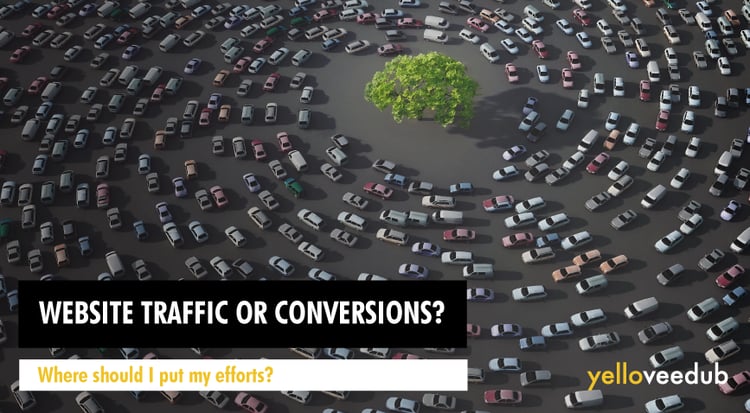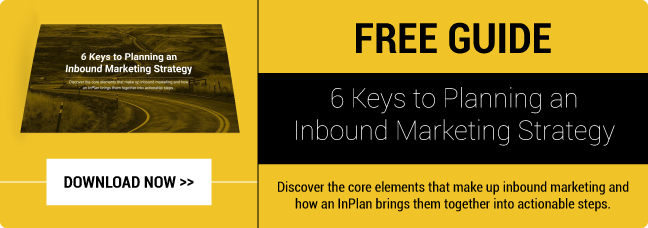
Watching the number of website clicks on your Google Analytics increasing is definitely a great feeling! However, if the only thing that is increasing is your website clicks and not your clients, your email list, the number of your calls or your dental treatment sales, then you need to start being concerned.
Website traffic or Conversions? Read on to discover which marketing metrics you should focus on
Download our free guide here for tips on planning an online marketing strategy to grow your dental practice.
Before we start analysing today’s topic, let’s take a look at some definitions that we are going to use in this article.
What is Conversion?
When you drive traffic to your website and expect the visitor to take an action, then this action is described as conversion. A conversion could be:
- A dental treatment eBook download
- Booking a free consultation
- Booking an appointment
- Claiming an offer
- Signing up for the practice’s newsletter
- A call to the practice
What is Conversion Rate?
The conversion rate is the number of people who took action on a specific page on your website divided by the number of website clicks on that page. You can calculate your website’s conversion with this simple equation:

My Conversion Rate Is Very Low
If your conversion rate is very low then one of the first things you have to do is to check your Bounce Rate (it is the percentage of visitors who enter your site and then leave without viewing other pages within the same site). If your Bounce Rate is high, it means that there is something wrong with your landing page or its content. It’s an indicator that visitors are expecting something different than what they see on your website, so they bounce.
Some of the main reasons why your website isn’t converting are listed below:
-
Content:
Sometimes you may have great and well-written content but it does not automatically mean that this content is tailored to your target audience’s needs. For example, if you are trying to explain what Dental Implants are in a scientific language then you will probably lose your visitor from the very first paragraph of your content.
As Ralph Waldo Emerson once said:
To be SIMPLE is to be GREAT.
-
User Experience:
Have you ever tried to load your website on a mobile phone? Or have you ever checked how much time does it take for your website to load?
If your website is taking ages to load then probably visitors won’t navigate through different pages on your website or probably they won’t even wait for it to load. Also, you need to make sure that your website is responsive. Your website may look great on desktop but not on mobile devices so you may be losing visitors and conversions without realising it.
-
Paid Traffic Targeting:
If you are running a paid traffic campaign (Facebook Ads, Google Adwords, Twitter Ads, Linkedin Ads) to drive traffic to your website and your Bounce Rate still is very high, then you may not be targeting the right audience.
Before running a paid traffic campaign you need to conduct an in-depth research in order to identify your target audience’s specific needs, behaviours, interests, age group and location. By doing so you will definitely decrease the bounce rate and enhance the user's interactions on your website. Creating your Buyer Personas before start advertising is a must!
My Website’s Bounce Rate is Low
If your website’s bounce rate is significantly low and none of the above is an issue but you are still not getting conversions, then probably your website’s content is not action oriented. By action oriented we mean lack of Call To Actions on your landing pages.
We have already listed above what a conversion could be, Call To Action (CTA) is the trigger to this conversion. CTA could be an anchor text, an image, a phone number, bold text etc. which is asking the reader to take some further action on the website.
Website Traffic or Conversions? Where should I put my efforts
You may probably be wondering what the answer to the main question is. The answer is to focus on improving your Website’s Performance in order to increase your Conversion Rate and then start focusing on how you can grow your Website’s Traffic.
We have created an example below to give you a better understanding of why you should first focus on increasing your conversion rate rather than growing your traffic:
- In our example, we have used two scenarios. The first scenario refers to the action of doubling the Website Traffic per month, which is very difficult to achieve, whilst the second scenario refers to the action of increasing the monthly conversion rate of your website.
|
Current Website Status |
Scenario #1 - Increase Traffic x2 |
Scenario #2 - Increase Conversion Rate to 4% |
|
|
Monthly Website Visitors |
3000 |
6000 |
3000 |
|
Conversion Rate |
1.8% |
1.8% |
4% |
|
Number of leads/patients |
54 |
108 |
120 |
As you can see by focusing on increasing the Conversion Rate of our website, with the same monthly traffic, we can achieve greater results than focusing on how to grow our traffic. If you get to increase your website’s conversion rate then you may start looking at ways to increase your monthly traffic!
Here are some suggestions on how to increase your traffic:
- Paid traffic - Make sure you are targeting the right audience!
- Monthly Newsletters
- Blogging more frequently
- Engaging with your audience on Social Media
- Improving your site’s visibility on Search Engines
Synopsis
Increasing both Website Traffic and Website Conversion is very important. However, before you start thinking on how you can grow your website traffic you first need to analyse and troubleshoot your website, so you make sure users are getting what they expect from it. All the actions that will enhance users experience, will increase conversion rate. And, when your website’s conversion rate increases, you can start thinking on how you can grow your traffic!
Did you find this article helpful? Do you have any questions on the topic? Let us know in the comments below!
.png?width=694&height=280&name=YVD%20Branding_Logo%20(WHITEBG).png)

